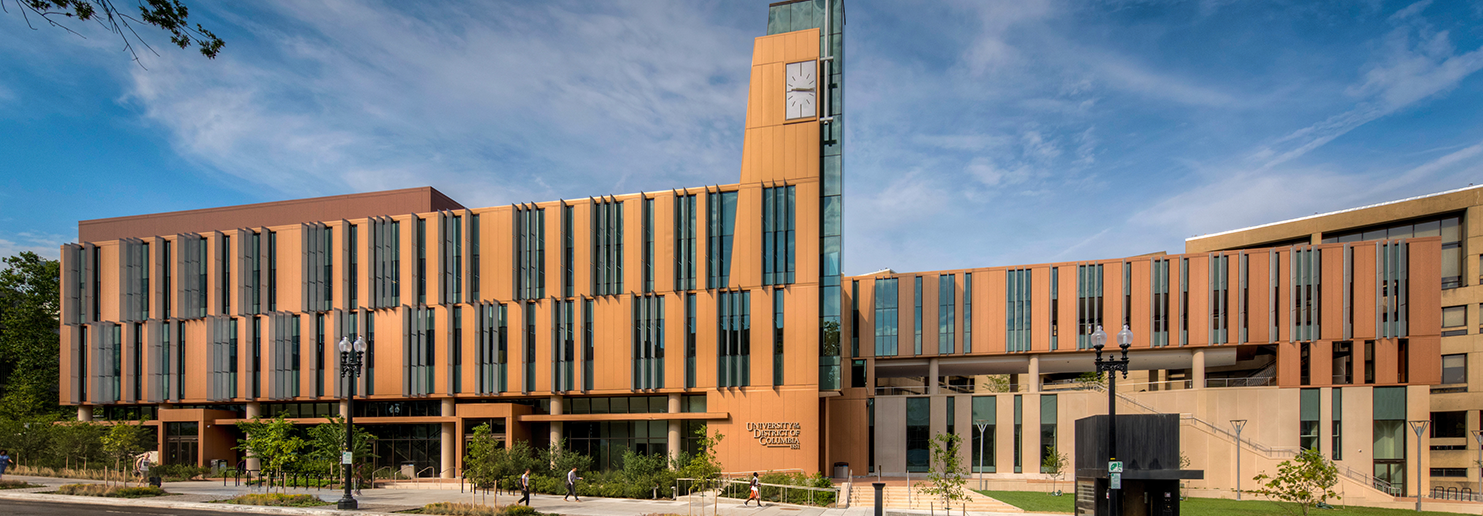Speech-Language Pathology: The UDC Edge
Experience | Commitment | Students First
SLP Home | Program Requirements | Program Faculty | UDC-NSSLHA | Course Descriptions | Courses & Examinations | Strategic Plan
SLP Course Descriptions
1109 500 Sociolinguistic and Theoretical Perspectives on Language (3)
This course provides the fundamental concepts of theoretical linguistics and sociolinguistics and their applications for speech-language pathologists and other professionals who work with culturally and linguistically diverse (CLD) populations. In addition to surveying the linguistic characteristics of a variety of American English dialects, the course focuses on language and its linguistic theories that address natural language change and variation. This knowledge will enhance evidence-based practice by applying these theories in clinical practice when working with culturally and linguistically diverse populations. Prereq: Graduate standing.
1107 552 Aural Rehabilitation (3)
This course provides an overview of acoustical and perceptual phonetics and the impact of hearing loss. Addresses assessment of hearing-impairment and its implications for habilitation. Reviews techniques for speech-reading, auditory training and counseling, including an overview of cued speech, manual communication systems and amplification systems (auditory training units, hearing aids and assistive listening devices). Prereq: 1107 520.
1109 507 Speech and Hearing Disorders and Related Disciplines (3)
This course provides an overview of the practice of speech-language pathology including requirements for certification as an SLP, the discipline’s code of ethics, and disorders and client populations served by the SLP. This course is required for new graduate students without an SLP background. Prereq: Graduate standing.
1109 520 Neuroanatomy of the Speech and Hearing Mechanism (3)
This course examines the anatomy and physiology of the central and peripheral nervous systems as they relate to the speech and hearing mechanisms. Prereq: Graduate standing.
1109 534 Stuttering (3)
This course examines the definition and description of stuttering as a disorder of fluency; discussion of speech and non-speech behaviors; types of stuttering; form of stuttering; incidence and prevalence of stuttering, etiology, onset and development of stuttering; assessment and treatment strategies. Prereq: Graduate standing.
1109 535 Language Disorders (3)
This course examines the pragmatic, semantic, and syntactic features of children exhibiting disorders or oral and written language. Provides practical experience in the use of common language assessment protocols and the application of various language intervention strategies. Requires a basic knowledge of normal language acquisition. Prereq: SPLP 510.
1109 536 Articulation and Phonological Disorders (3)
The course focuses on systems of speakers exhibiting phonological disorders, with emphases on diagnosis, , analysis of phonological data, and remediation strategies. Discusses normal phonological acquisition as a baseline for examining disordered systems. Prereq: 1109 510
1109 555 Communication Modalities (3)
The course is designed to assist the learner to develop an understanding of augmentative/alternative communication (AAC.) The course emphasizes information that assist skill development in assessment/intervention procedures for verbal and non-verbal individuals with significant communication disorders. Technology related to other disabilities will also be reviewed. Apps for each topic will be integrated into the class discussion. Prereq: Graduate standing.
1109 560 – 564 Practicum in Speech (3 credits for each of 5 sections)
This course provides supervised clinical practicum in the identification, diagnosis, and treatment of communication disorders. Including techniques of interviewing and counseling. Includes discussion of requirements for the profession and professionalism. Prereq: Permission of the clinical director.
1109 610 Speech Science (3)
This course focuses on the production of and reception of speech and speech sounds. Emphasis is placed on how speech is produced (phonation and respiration), how vowels are produced (concepts of resonation), and consonants (distinctive features), how sound travels through air (acoustics), how the auditory system picks up sound (hearing) and transmits the speech signal to the brain (auditory processing) where it is comprehended (language and cognitive processing.) The course presents the basic acoustics of speech and sound waves as well as spectrographic analyses of speech. Instrumentation will be used to analyze voice and speech production. Prereq: Graduate standing.
1109 634 Aphasia (3)
The course focuses on language disorder in adults and children caused by lesions of the central and peripheral nervous systems. Discusses specific disorders such as aphasia due to left hemisphere lesions. Congenital aphasia, language disturbances caused by right hemisphere lesions, traumatic brain injury and dementia, including Alzheimer’s disease and an introduction to psychogenic disorders. Prereq: 1109 520
1109 635 Voice Disorders(3)
This course examines the perceptual and physical characteristics of disorders of voice. Discusses the etiology of these disorders and various assessment and treatment procedures. Prereq: SPLP 520.
1109 637 Motor Speech Disorders (3)
Focuses on the clinical processes of diagnosis and management of motor speech disorders. The nature, etiology and physiology of normal and abnormal patterns that may impact a person’s motor speech skills will be discussed across the lifespan. Current theories on the underlying neurological bases for motor speech disorders will be discussed as well as the general speech characteristics that accompany apraxia of speech and various dysarthrias. Assessment procedures, differential diagnosis and treatment techniques will be addressed and the efficacy of the techniques as they related to behavioral, surgical and pharmacomedical interventions. Prereq: 1109 SPLP 520
1109 638 Dysphagia (3)
Focuses on the nature, etiology and physiology of normal and abnormal patterns of swallowing and different disorders that may impact a person’s ability to swallow will be discussed across the lifespan. The course is designed to build the student’s knowledge and skills as they relate to the evaluation and management of dysphagia in the child and adult population. Prereq: 1109 SPLP 520
1109 674 Research Methods in Communication Sciences (3)
Introduces students to basic research and statistical procedures in the communication sciences; demonstrates how research can be used to answer important questions in both speech-language-hearing disorders. Prereq: Graduate standing.
1109 695 Independent Study (3)
Independent Study allows graduate students the opportunity to explore areas of academic interest in which no formal course is available. Gives the graduate student the opportunity to explore and area which may lead to a thesis problem or which will further understanding in a particular area. Prereq: Permission of Acting Program Director
1109 698 Elective Subject varies. (3)
1109 699 Thesis (VC)
The Thesis provides the student an opportunity to apply research theories and methodologies to the study of a topic of importance in the selected discipline. Enrolls students in the course according to their areas of concentration and faculty availability and willingness to direct the thesis project. Prereq:
Prerequisite Courses
Introduction to Linguistic Analysis (Phonetics) (3)
This course provides a general introduction to articulatory phonetics, distinctive feature analysis, and phonology, as well as the morphological and syntactical structures of English. The role of this course in the curriculum is to provide a foundation for the analysis of spoken English so that students can complete related graduate-level coursework, differentiate communication disorders from communication differences, and provide appropriate services to persons with communication needs.
Audiology (3)
An overview of Audiology provided by dissecting various Audiology services and its invaluable impact on individuals of all ages with hearing loss and their communication partners.
Speech & Hearing Disorders and Related Disciplines (3)
This course provides an introduction to the field of speech-language pathology. Students are given an overview of the profession, a review of the standards leading to certification, an overview of the ASHA Codes of Ethics, a survey of disorders of speech, language, cognitive-communication, swallowing and hearing and a summary of methods used to assess and manage the various disorders of communication. Students enrolled in this course are also required to complete 25 hours of direct observation in the discipline for which certification is being sought. The observation requirement provides students, guided real-life exposure to disorders of communication and/or swallowing. The observation hours are intended to facilitate student learning from theory to practice.
Anatomy & Physiology of Speech and Hearing (3)
This is an undergraduate introductory course directed toward the study of normal anatomy and physiology of the speech and hearing mechanism. This course is designed to provide students in communication sciences and disorders an introduction to the anatomical, physiological and neurological principles fundamental to the understanding of speech production and hearing. This introductory course will focus primarily on normal aspects of communication behavior. The course is organized around the four main systems of speech: the respiratory, phonatory, articulatory, resonation, as well as the auditory and nervous system. This course is a pre-requisite course towards the Master of Science degree program in Speech-Language Pathology approved by the American Speech-Language and Hearing Association (ASHA) and the accrediting body for professional training programs in Speech-Language Pathology.
This course is designed as a major course with emphasis on the neurophysiological and biological substrates of language and communication disorders including the etiologies characteristics anatomical/physiological acoustic, psychological, developmental, and linguistic and cultural correlates. This course incorporates principles outlined in Standard III as set forth in the American Speech, Language and Hearing Association (ASHA) Standards and Implementation for the Certificate of Clinical Competence in speech-language pathology
Diagnostics (3)
This course presents principles and procedures for culturally relevant assessment of communication disorders in children and adults. The course provides opportunities for practice with selected methods and tools.





